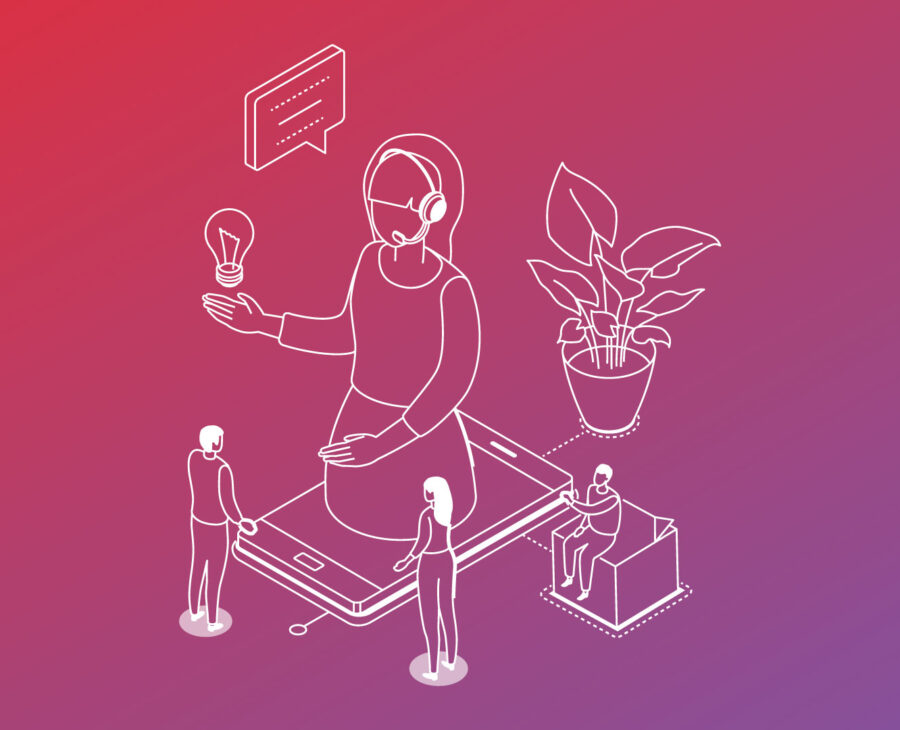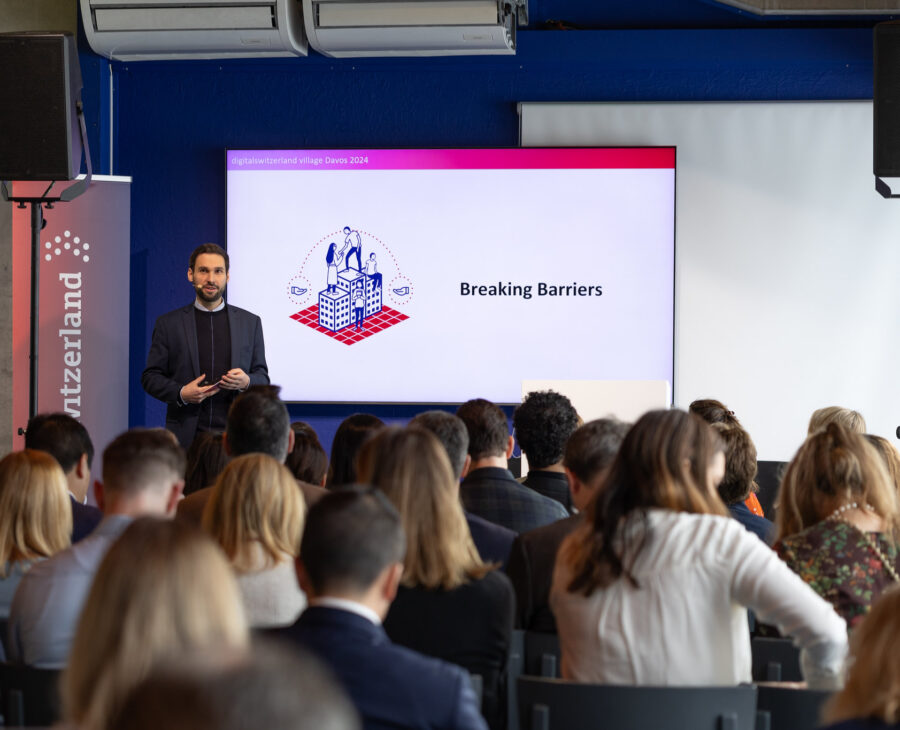Digital transformation is here to stay. We must therefore constantly foster dialogue to increase awareness for all that is and will become digital. Digitalization brings not only opportunities, but also risks that need to be addressed and taken seriously. In my series “Dialogue Interviews” I discuss these topics with leaders in Switzerland, from our member organisations to digital shapers and the brightest minds in the fields of technology and innovation.
For this edition, I talked to Pedro Bados, Co-founder and CEO of Nexthink. Nexthink’s self-described mission is to help IT departments transform the way they service and support employees. Consequently, our conversation touches on the digitalisation of the workplace, on Nexthink’s homebase in Lausanne and Switzerland’s position in a global digitalisation ranking.
Nicolas Bürer: You are the Co-founder and CEO of Nexthink: how was the company founded and how does your technology help transform the way people work?
Pedro Bados: Nexthink was launched as a result of a research project conducted at the prestigious École Polytechnique Fédérale de Lausanne (EPFL). I had been working on a project, which attracted the attention of a large multi-national company who told me that if this idea could be turned into a product, they would buy it. To this day, this company remains one of our customers.
We transform the way people work by allowing them to focus on their jobs and their goals, rather than trying to fix their own IT problems. IT promised so much but is too often a factor of hassle that inhibits employees’ productivity. Devices are slow, applications crash and connectivity can be patchy – and the current way of fixing these issues doesn’t work. On average, every employee loses 22 minutes a day trying to deal with IT issues. And only 50% of problems are even reported to the IT department. Our technology monitors potential IT problems, provides fixes and informs employees the problem is solved. This without any direct involvement from the employee. We are absolutely convinced that this is going to have a significant impact on the way people use IT in the workplace.
Nicolas Bürer: What trends do you expect to surface over the next three to five years related to the digital workplace? What’s your advice to companies trying to keep pace with innovation?
Pedro Bados: Workplaces are definitely going to get more complex over the next years. There will be increased technology complexity – with more dispersed workforces, an increasing number of connected ‘things’, and data collected on anything and everything. But, employees should not be expected to manage their own IT as it will prevent them from doing the work that they were hired to do.
It has also been widely reported that the jobs we do are changing. People will be more focused on what humans do best: creativity, providing perspective and insight, teamwork and collaboration, while other more task-oriented work will become increasingly automated.
All this means that the employees’ experience with technology will become more critical to a business’ success. Traditionally, ‘employee experience’ efforts focused on organisational culture and workspaces, but technology is an increasingly important element that will have an impact on employee engagement and productivity.
Nicolas Bürer: Nexthink raised $85m at the end of 2018, has 1,000+ customers and is doubling revenue every year. You are still headquartered in Lausanne, Switzerland. What keeps you here?
Pedro Bados: Lausanne is where our business started and it has served us incredibly well so far. For engineering talent, we are close to one of the best engineering schools in Europe, which was important when we were starting out and remains important today.
As we have grown, many people in our team have built their lives here and we are committed to give people stability so they feel at home at Nexthink and in the city. Lausanne and the surrounding area is a great place to live so we are able to attract the best talent, which is critical as the battle to hire the best people is fierce.
We also have a US headquarter in Boston and other offices around the world in the US, Europe, Middle East and Asia-Pacific – so there are also lots of opportunities for people elsewhere to grow their careers and contribute to the business.
Nicolas Bürer: Is Switzerland a leading country in regards to innovation and technology or do you think that we are mostly following global trends?
Pedro Bados: Switzerland, and Lausanne in particular, is definitely strong in fundamental research – physics, mathematics, etc. Because of this, the country has an opportunity to be a great location for innovation; but it doesn’t always deliver and this is something we all need to work on.
We are an international business and Switzerland has the opportunity to be central to that – geographically and culturally –, because it helps us to be connected via language, regulations, time zones and people. Sometimes, I wonder if Swiss businesses and authorities shouldn’t be a bit more “aggressive”, though, to achieve the country’s full potential?
There are other major, and perhaps more obvious, innovation hubs in Europe – London, Berlin, Stockholm, Amsterdam – but Switzerland is so open, international and welcoming that it offers something different and we should encourage as much Swiss-born technology innovation as possible.
Pedro Bados: Nicolas, let me ask you a few questions: How have you seen digital innovation evolve over the past few years in Switzerland?
Nicolas Bürer: Switzerland has made very good progress in the past five years. There are over 130 initiatives focusing on digital innovation, which is quite remarkable. Look at all the incubators, accelerators, coaching offers, awards, events, etc… without even counting all the startups and corporate innovation teams, I’m just referring to the independent initiatives. In addition, I feel there is a new wave of digital entrepreneurs in the country that is more ambitious and willing to take a global perspective, like you, for example.
In 2018, 1.25 billion CHF were invested in equity capital in Swiss startups, which is a record that confirms the 30% growth year after year for the past six years. Encouraging!
Pedro Bados: Have you seen enough venture capital supporting the local Swiss ecosystem and what could be done to attract more investment?
Nicolas Bürer: This is definitely one of the pain points in the country, especially compared to China, the US, Germany and Israel. I think we have a good pool of business angels for a first founding round venturing below 1 million CHF.
There are a lot of new VCs which will start investing in the country and which are raising below 100 million CHF, meaning they will support in Seed up to Series B. Many entrepreneurs are part of these VC’s and it will bring new impulse to the market.
This year the Swiss Entrepreneur Fund has raised CHF 190 million CHF to invest in the ecosystem. I think this Fund can be a game changer since it can continue raising up to a few billions but will also attract many international VC’s to look closer at the Swiss ecosystem, as Youzma did 30 years ago in Israel. We have by far not reached the point of raising 100 million or even 500 million CHF from Swiss investors, but maybe in five to seven years? It is definitely not impossible!
Pedro Bados: What do you want to see from Switzerland’s technology leaders like Nexthink and others to boost the country and its reputation in the world?
Nicolas Bürer: I would like to focus on three things: First, you should continue to be ambitious, to leave your mark on the world. Sweden has Spotify, Estonia had Skype and Switzerland also needs some incredibly successful companies with strong international brands. Secondly, when you are abroad, don’t forget to mention your Swiss home base. Swiss entrepreneurs are the best spokespeople for the country abroad and people in your sector will listen to you when you explain your reasons for being based in Switzerland. Finally, give a bit of your time every year and share your know-how and experience with younger Swiss entrepreneurs through coaching, keynotes and workshops. All of this will help the Swiss ecosystem to continue to grow in the coming years.






